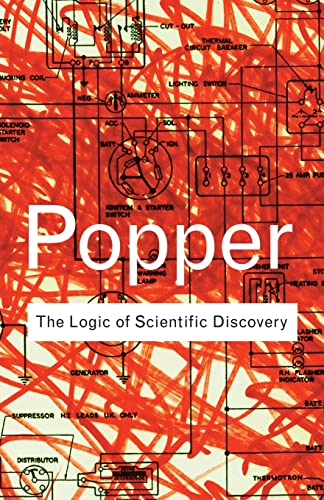The Logic of Scientific Discovery (Routledge Classics)
Karl Popper
BOOK REVIEW

In the realm of philosophy and science, few names resonate as profoundly as Karl Popper. His seminal work, The Logic of Scientific Discovery, does not merely dissect the anatomy of science; it usurps the very foundations upon which we build our understanding of reality itself. With a compelling blend of intellectual rigor and provocative insight, Popper's text demands your attention. Forget everything you thought you knew about the scientific method; this book will challenge you to rethink the line between knowledge and speculation.
Delving into the fabric of empirical testing and falsifiability, Popper takes the reader on a cerebral rollercoaster that oscillates between clarity and complexity. He dismantles the notion of verification, asserting that it is falsifiability that serves as the cornerstone of the scientific process. It's as if he nudges you gently yet firmly, declaring, "True science isn't about finding evidence that supports your ideas; it's about rigorously testing and challenging them." The exhilaration of discovery lies precisely in this critical framework.
But why does this matter? In an era where misinformation spreads like wildfire, Popper's philosophy emerges as a beacon of hope. It teaches us the vital importance of skepticism, compelling us to scrutinize not just the claims of scientists but the vast swaths of information bombarding us daily. The ability to question, to doubt, to seek verification-not as an adversary but as an ally-can revolutionize our approach to knowledge in every discipline imaginable.
Popper's influence resonates far beyond the confines of academia; it has impacted influential figures across various fields. Think of the renowned physicist Stephen Hawking, whose work on black holes and the very fabric of the cosmos was deeply inspired by Popperian principles. Or consider the tech revolution led by the likes of Elon Musk, where innovation thrives on challenging the status quo, testing hypotheses, and pushing boundaries. The entrepreneurs and scientists of our age are shaping a world that adheres to Popper's call for relentless inquiry.
Readers who pick up this dense tome often find themselves divided. Some champion its brilliance, admiring how Popper redefines scientific integrity. Others, however, can find his arguments labyrinthine, feeling lost in a sea of philosophical jargon. A common critique? The belief that Popper's ideas are more idealistic than practical. How can one hope to apply the rigorous standards of falsifiability in the rapidly changing landscape of modern science? Yet therein lies the genius of The Logic of Scientific Discovery-it poses uncomfortable questions that demand answers.
It's worth noting the historical context in which Popper wrote. Emerging from the shadows of World War II, a time when dogma and ideology threatened to eclipse reason, his work was, in many ways, a clarion call for rationality. Popper stood against the rising tide of totalitarianism, asserting the power of critical thought and scientific inquiry as essential safeguards against tyranny. The shadows of those tumultuous times echo through his pages, making them not only a philosophical text but a manifesto for freedom of thought.
Reading this book is tantamount to embarking on an intellectual pilgrimage; each chapter unfurls a new layer of understanding, pulling you into the depths of epistemology. It emerges as a guide-not merely for scholars but for anyone who finds themselves yearning for enlightenment in an age riddled with uncertainty and ambiguity.
Popper doesn't shy away from the emotional weight of responsibility that comes with knowledge. His prose often evokes a sense of urgency, as if he's daring you to act on the ideas he presents. "Knowledge is a living, breathing entity," he seems to suggest, "and it's your duty to nurture it with the nourishment of critical inquiry."
In conclusion, The Logic of Scientific Discovery is not simply a collection of philosophical musings; it is an invitation to transcend the limitations of complacency. It challenges you, the reader, to think critically, to question relentlessly, and to embrace the chaos of discovery. Don't let this be just another book on your shelf-let it be a catalyst for change, a torch illuminating the shadows of ignorance. Your journey into the heart of scientific discourse begins with Popper. Are you ready to take the plunge? 🌌
📖 The Logic of Scientific Discovery (Routledge Classics)
✍ by Karl Popper
🧾 544 pages
2002
#logic #scientific #discovery #routledge #classics #karl #popper #KarlPopper